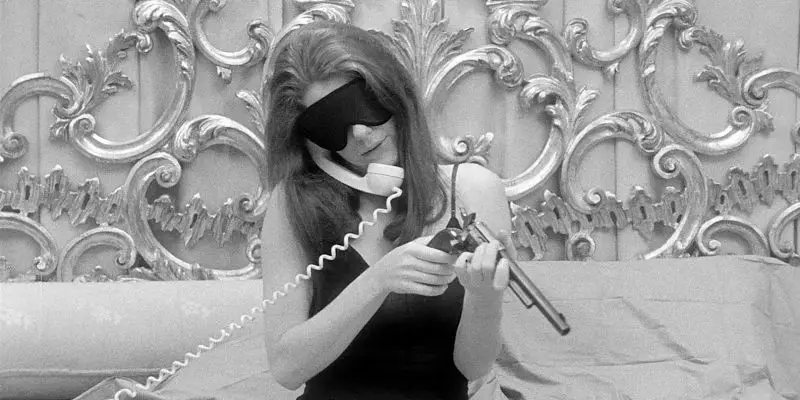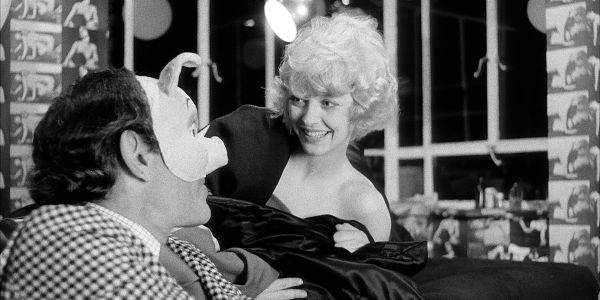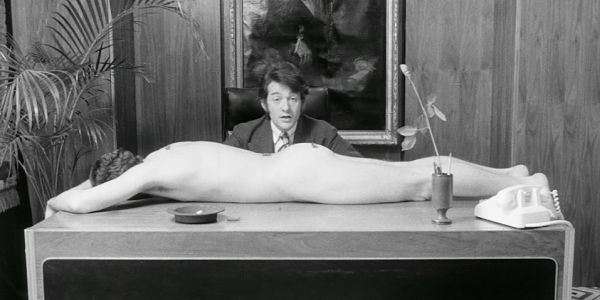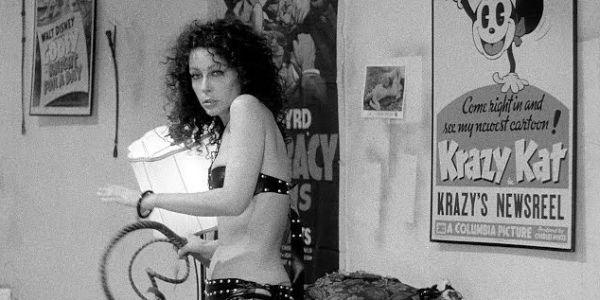Stars And Stripes And Oh, Mr. Smith: An Analysis Of THE TELEPHONE BOOK

All articles contributed by people outside of our team are…
In 1971 a particularly interesting film bestowed with an X rating made its way to a limited release in New York City and Los Angeles. This film was not a commercial success. It was a film that was so “out there” some reviewers refused to even see it. This film was writer-director Nelson Lyon’s first and only film: The Telephone Book.
It follows the story of Alice (Sarah Kennedy), a perky blonde with a voice reminiscent of Betty Boop as she tries to track down a man, a Mr. John Smith, in Manhattan who paid her an extremely dirty phone call, and with whom she is now in love. She goes on a journey through sexual-liberation-era New York and meets a cast of comically sexual characters; all the while the film is interspersed with confession scenes from “reformed” obscene callers.
While on the surface the film appears to be a parody of mondo films (an exploitation documentary that often dealt with taboo subjects,) and sexploitation comedies, the movie is actually a scathing critique of America.
Representations of sexuality in the seventies
In 1971, America was in the midst of an unpopular war with Vietnam, the Cold War with the Soviet Union was in full swing, and not that long ago America fought another failure of a war in Korea. One thing all three of those wars have in common is that it was the great, God-fearing American capitalists against the dirty, Godless communists. Nelson Lyon was an advertising man with a penchant for European cinema. As a fan of European cinema he knew that it was en vogue to portray characters of certain political parties as sexual deviants— Nazis and fascists were often portrayed this way, as was the occasional communist.

Using his knowledge, he created a film using the European model to portray America as a country whose own being promotes abhorrent sexual behavior. As an ad man he understood the importance of subliminal advertising, and he also knew what advertisers have always known: sex sells. Sexual liberation was at the front and center of the late 1960s to mid 1970s, and Lyon himself was heavily involved with the drugs and the orgies that were staples of that time.
Additionally, during this time period it was a common occurrence for American women to receive lewd phone calls from strange men. In The Telephone Book, Lyon used the cultural relevance of sexual liberation and obscene phone calls as a guise to hide his subliminally placed critique of America.
Hidden meanings
When viewing the film there are quite a few clues that key the viewer in to the fact of what the film is truly about. The first clue that this film is secretly about America comes in the title sequence. The name of the animation company who created the animated sequence at the end of the film was called “Stars and Stripes Productions Forever.” The company was known for making humorous animated commercials, and their name is an obvious reference to the flag of the United States.
The Telephone Book is the only film that this company ever provided animation for. Upon inspection, it becomes apparent that there was actually only one animator involved in the sequence in this film. That animator was Leonard Glasser, the owner of “Stars and Stripes.” While the company itself was not actually involved in making the animated bit, its name was added to the title sequence for the astute viewer to notice.
The second clue is the American flag bedspread in Alice’s bedroom. Her room is covered in sexual imagery, from the wallpaper comprised of porn-stills to the giant breast on her wall, and yet the bedspread, that she later wraps herself in, is a giant American flag. The flag used as a bedspread for a character who herself is a sexually liberated woman implies the desecration of the country. By placing the most revered American iconography in a pornographic setting it makes a statement about the perversity of the country.

The statement it makes is that America is a country of excess, as apparent by the myriad porn-stills; it is a country of perversity. Alice’s wrapping herself in the American flag blanket at the end is a form of desecration of the flag, which symbolizes the problems of the country.
The third clue is when Alice recounts her adventures with the man who woke up with a perpetually erect, foot-long penis. He describes his penis as “hard, tall, tough. It looked almost patriotic.” (00:36:11.) The viewer has to wonder why an erect, gargantuan penis is patriotic. His description of his penis could also be used to describe something else, something that is decidedly patriotic, and that is a soldier. He is comparing his penis to an American soldier. He goes on to describe how no matter what he does he cannot seem to make his erection go down. This adds to the penis as American soldier allegory, as the way he feels about his unending erection is the way that many Americans felt about the war in Vietnam, unending.
Finally, the only way for his erection to subside is by having sex with Alice. Alice represents the war itself, and by succeeding in alleviating his erection it represents a tough American soldier being destroyed by the war, which is why, when his upright member is finally flaccid, he cries “I’m scared. I’m scared.” (00:40:25.) America is a country that sends its brave, young men to war and destroys them.
The Mystery Caller
The fourth clue is when Alice eventually meets her mystery caller, John Smith (Norman Rose). He goes on to tell he his backstory, which is when the entire point of the movie makes itself painfully clear. John Smith tells Alice:
Six years ago, I wasn’t nervous. I was a fighter. A killer. A destroyer. A man who loved his country. I was a captain. Fought the yellow reds, killed ‘em left and right… I got written up in all the national publications as the good, clean, living answer to all the rotten, infected freaks that were disturbing the peace. I went on a national TV talk show… I turned toward the camera and I said: Now look here, there may be a few things wrong with this country, but…these problems are not gonna be solved by people who won’t participate, people who won’t belong, people who aren’t even people. (01:04:38.)
John Smith was the embodiment of the perfect American soldier. He was a true American who believed in his country, and when his country needed him to fight the communists, he did. However, all that glory, that was all six years ago. Now he has changed, he is no longer that man. He continues to tell her how he transformed from the great American man, a man who did not make obscene phone calls but was happily married with a wife and child and enjoyed a healthy sex life. How he went from being that man to one who gains his sexual pleasure through deviant sexual behavior.

He tells Alice that he was asked, as the great American that he was, to become an astronaut. This, of course, is a mention to the space race against the Soviet Union. He describes how America, despite being the country of freedom, spies on its people by describing to Alice that the government knew everything about him, right down to how often he and his wife had sex. When in training to become an astronaut he goes into the weightless chamber. While in the weightless chamber he sees what he describes as “a big, beautiful, red-nippled, giant tit.” (01:11:02.)
This is the moment where he is no longer a patriotic, good, clean American. Red was a symbol of communism, and his seeing the beauty in the red nipple is his change from capitalistic, ego-driven American, to someone who the country can no longer support and he is declared insane by NASA. This shows that America is a country that loves its citizens only when they make the country look good, when they don’t or when they go crazy, even at the fault of the country, America turns its back on them and hides them away.
The Star-Spangled Climax
Finally, the fifth and last clue that this film is truly about America is during the end animation sequence, which follows a cartoon vagina hunting for sexual gratification. Along the way, receiving that gratification from a disembodied tongue, multiple men, and even a building. The vagina continually wants more. When the vagina eventually reaches its climax, red, white and blue stripes psychedelically flash through the background. This sequence signifies the nature of America and the capitalist society. It is a country of greed, of more, more, more. It is a country of everyone looking out solely for him or herself.
In The Telephone Book, each character is portrayed as some sort of sexual deviant: the more patriotic or American the character is, the more perverse. These are not people who are portrayed as having been born perverted, but having been made that way by their country. This film utilizes the sexual revolution as a means to portray its own views on the state of the country. While the film cannot be looked at as truly successful, as it had a limited release, got poor reviews, and all but disappeared for 40 years until it resurfaced around 2013 for DVD release, it is still a highly intelligent movie that uses subliminal advertising techniques to make its point.
Portraying sexual perversion as an allegory for American patriotism is daring – can you think of other similar films? Do you think modern filmmakers would get away with it?
You can find The Telephone Book on Amazon.
Guest Author
Amanda Jane Stern

Amanda Jane Stern is a writer, director and actress from New York City. She graduated Phi Beta Kappa from Brandeis University in May 2015. She can often be found in the most hipster of coffee shops typing away on her laptop. Yes, she knows that’s a total cliche. Follow her on Twitter and Instagram.
Does content like this matter to you?
Become a Member and support film journalism. Unlock access to all of Film Inquiry`s great articles. Join a community of like-minded readers who are passionate about cinema - get access to our private members Network, give back to independent filmmakers, and more.
All articles contributed by people outside of our team are published through our editorial staff account.













